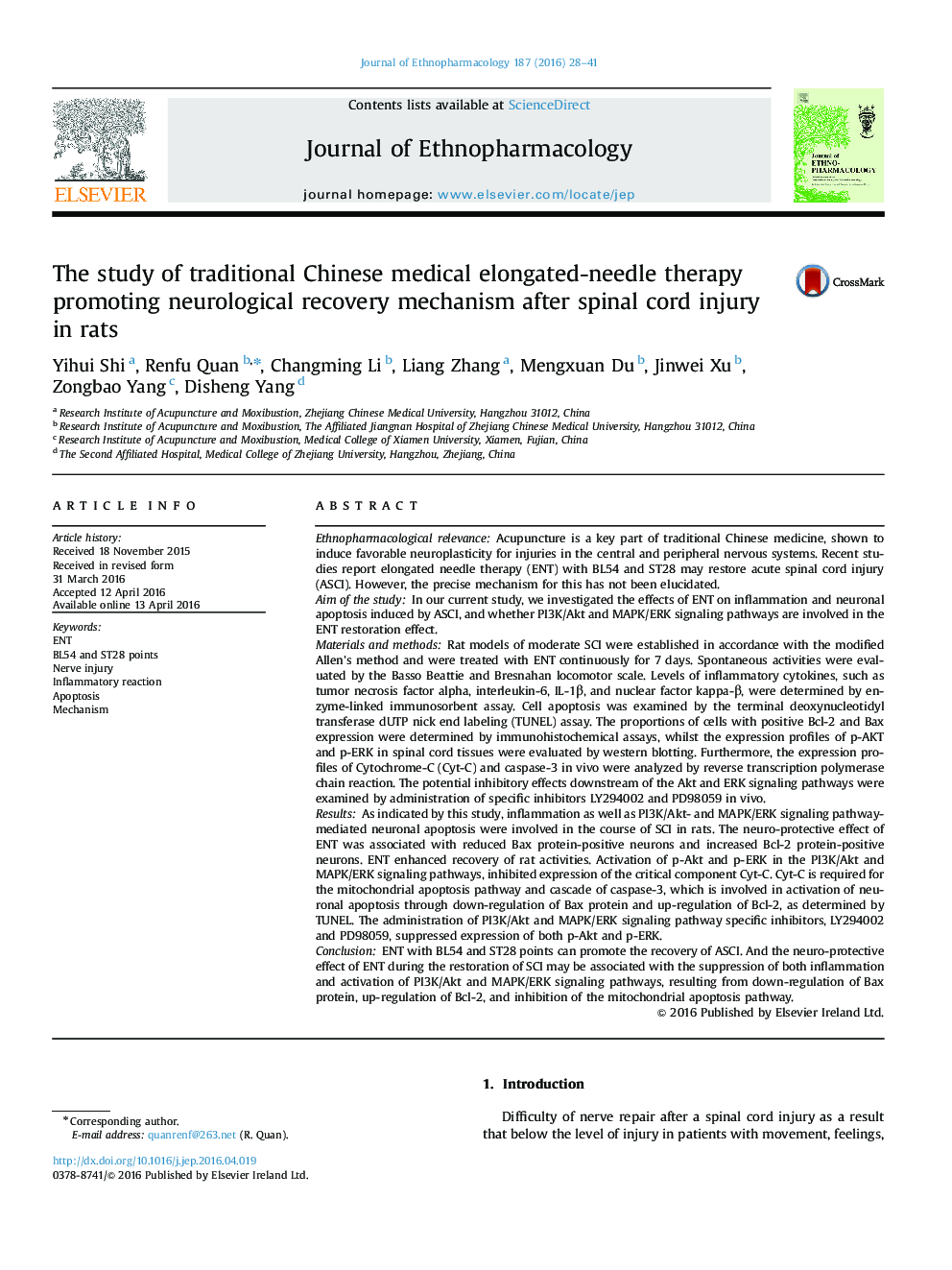| کد مقاله | کد نشریه | سال انتشار | مقاله انگلیسی | نسخه تمام متن |
|---|---|---|---|---|
| 2544659 | 1560375 | 2016 | 14 صفحه PDF | دانلود رایگان |
Ethnopharmacological relevanceAcupuncture is a key part of traditional Chinese medicine, shown to induce favorable neuroplasticity for injuries in the central and peripheral nervous systems. Recent studies report elongated needle therapy (ENT) with BL54 and ST28 may restore acute spinal cord injury (ASCI). However, the precise mechanism for this has not been elucidated.Aim of the studyIn our current study, we investigated the effects of ENT on inflammation and neuronal apoptosis induced by ASCI, and whether PI3K/Akt and MAPK/ERK signaling pathways are involved in the ENT restoration effect.Materials and methodsRat models of moderate SCI were established in accordance with the modified Allen's method and were treated with ENT continuously for 7 days. Spontaneous activities were evaluated by the Basso Beattie and Bresnahan locomotor scale. Levels of inflammatory cytokines, such as tumor necrosis factor alpha, interleukin-6, IL-1β, and nuclear factor kappa-β, were determined by enzyme-linked immunosorbent assay. Cell apoptosis was examined by the terminal deoxynucleotidyl transferase dUTP nick end labeling (TUNEL) assay. The proportions of cells with positive Bcl-2 and Bax expression were determined by immunohistochemical assays, whilst the expression profiles of p-AKT and p-ERK in spinal cord tissues were evaluated by western blotting. Furthermore, the expression profiles of Cytochrome-C (Cyt-C) and caspase-3 in vivo were analyzed by reverse transcription polymerase chain reaction. The potential inhibitory effects downstream of the Akt and ERK signaling pathways were examined by administration of specific inhibitors LY294002 and PD98059 in vivo.ResultsAs indicated by this study, inflammation as well as PI3K/Akt- and MAPK/ERK signaling pathway-mediated neuronal apoptosis were involved in the course of SCI in rats. The neuro-protective effect of ENT was associated with reduced Bax protein-positive neurons and increased Bcl-2 protein-positive neurons. ENT enhanced recovery of rat activities. Activation of p-Akt and p-ERK in the PI3K/Akt and MAPK/ERK signaling pathways, inhibited expression of the critical component Cyt-C. Cyt-C is required for the mitochondrial apoptosis pathway and cascade of caspase-3, which is involved in activation of neuronal apoptosis through down-regulation of Bax protein and up-regulation of Bcl-2, as determined by TUNEL. The administration of PI3K/Akt and MAPK/ERK signaling pathway specific inhibitors, LY294002 and PD98059, suppressed expression of both p-Akt and p-ERK.ConclusionENT with BL54 and ST28 points can promote the recovery of ASCI. And the neuro-protective effect of ENT during the restoration of SCI may be associated with the suppression of both inflammation and activation of PI3K/Akt and MAPK/ERK signaling pathways, resulting from down-regulation of Bax protein, up-regulation of Bcl-2, and inhibition of the mitochondrial apoptosis pathway.
Figure optionsDownload high-quality image (113 K)Download as PowerPoint slide
Journal: Journal of Ethnopharmacology - Volume 187, 1 July 2016, Pages 28–41
